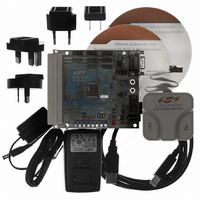C8051F020DK Silicon Laboratories Inc, C8051F020DK Datasheet - Page 25

C8051F020DK
Manufacturer Part Number
C8051F020DK
Description
DEV KIT FOR F020/F021/F022/F023
Manufacturer
Silicon Laboratories Inc
Type
MCUr
Datasheet
1.C8051F020DK.pdf
(272 pages)
Specifications of C8051F020DK
Contents
Evaluation Board, Power Supply, USB Cables, Adapter and Documentation
Processor To Be Evaluated
C8051F02x
Interface Type
USB
Silicon Manufacturer
Silicon Labs
Core Architecture
8051
Silicon Core Number
C8051F020
Silicon Family Name
C8051F02x
Lead Free Status / RoHS Status
Contains lead / RoHS non-compliant
For Use With/related Products
Silicon Laboratories C8051 F020/021/022/023
Lead Free Status / Rohs Status
Lead free / RoHS Compliant
Other names
336-1200
Available stocks
Company
Part Number
Manufacturer
Quantity
Price
Company:
Part Number:
C8051F020DK
Manufacturer:
SiliconL
Quantity:
10
- Current page: 25 of 272
- Download datasheet (2Mb)
C8051F020/1/2/3
1.3.
JTAG Debug and Boundary Scan
The C8051F020 family has on-chip JTAG boundary scan and debug circuitry that provides non-intrusive, full speed,
in-circuit debugging using the production part installed in the end application, via the four-pin JTAG interface. The
JTAG port is fully compliant to IEEE 1149.1, providing full boundary scan for test and manufacturing purposes.
Silicon Labs' debugging system supports inspection and modification of memory and registers, breakpoints, watch-
points, a stack monitor, and single stepping. No additional target RAM, program memory, timers, or communications
channels are required. All the digital and analog peripherals are functional and work correctly while debugging. All
the peripherals (except for the ADC and SMBus) are stalled when the MCU is halted, during single stepping, or at a
breakpoint in order to keep them synchronized.
The C8051F020DK development kit provides all the hardware and software necessary to develop application code
and perform in-circuit debugging with the C8051F020/1/2/3 MCUs. The kit includes software with a developer's stu-
dio and debugger, an integrated 8051 assembler, and an RS-232 to JTAG serial adapter. It also has a target application
board with the associated MCU installed, plus the RS-232 and JTAG cables, and wall-mount power supply. The
Development Kit requires a Windows 95/98/NT/ME/2000 computer with one available RS-232 serial port. As shown
in Figure 1.8, the PC is connected via RS-232 to the Serial Adapter. A six-inch ribbon cable connects the Serial
Adapter to the user's application board, picking up the four JTAG pins and VDD and GND. The Serial Adapter takes
its power from the application board; it requires roughly 20 mA at 2.7-3.6 V. For applications where there is not suf-
ficient power available from the target system, the provided power supply can be connected directly to the Serial
Adapter.
Silicon Labs’ debug environment is a vastly superior configuration for developing and debugging embedded applica-
tions compared to standard MCU emulators, which use on-board "ICE Chips" and target cables and require the MCU
in the application board to be socketed. Silicon Labs' debug environment both increases ease of use and preserves the
performance of the precision analog peripherals.
Figure 1.8. Development/In-System Debug Diagram
Silicon Labs Integrated
Development Environment
WINDOWS 95/98/NT/ME/2000
RS-232
Serial
Adapter
JTAG (x4), VDD, GND
TARGET PCB
VDD
GND
C8051
F020
Rev. 1.4
25
Related parts for C8051F020DK
Image
Part Number
Description
Manufacturer
Datasheet
Request
R
Part Number:
Description:
SMD/C°/SINGLE-ENDED OUTPUT SILICON OSCILLATOR
Manufacturer:
Silicon Laboratories Inc
Part Number:
Description:
Manufacturer:
Silicon Laboratories Inc
Datasheet:
Part Number:
Description:
N/A N/A/SI4010 AES KEYFOB DEMO WITH LCD RX
Manufacturer:
Silicon Laboratories Inc
Datasheet:
Part Number:
Description:
N/A N/A/SI4010 SIMPLIFIED KEY FOB DEMO WITH LED RX
Manufacturer:
Silicon Laboratories Inc
Datasheet:
Part Number:
Description:
N/A/-40 TO 85 OC/EZLINK MODULE; F930/4432 HIGH BAND (REV E/B1)
Manufacturer:
Silicon Laboratories Inc
Part Number:
Description:
EZLink Module; F930/4432 Low Band (rev e/B1)
Manufacturer:
Silicon Laboratories Inc
Part Number:
Description:
I°/4460 10 DBM RADIO TEST CARD 434 MHZ
Manufacturer:
Silicon Laboratories Inc
Part Number:
Description:
I°/4461 14 DBM RADIO TEST CARD 868 MHZ
Manufacturer:
Silicon Laboratories Inc
Part Number:
Description:
I°/4463 20 DBM RFSWITCH RADIO TEST CARD 460 MHZ
Manufacturer:
Silicon Laboratories Inc
Part Number:
Description:
I°/4463 20 DBM RADIO TEST CARD 868 MHZ
Manufacturer:
Silicon Laboratories Inc
Part Number:
Description:
I°/4463 27 DBM RADIO TEST CARD 868 MHZ
Manufacturer:
Silicon Laboratories Inc
Part Number:
Description:
I°/4463 SKYWORKS 30 DBM RADIO TEST CARD 915 MHZ
Manufacturer:
Silicon Laboratories Inc
Part Number:
Description:
N/A N/A/-40 TO 85 OC/4463 RFMD 30 DBM RADIO TEST CARD 915 MHZ
Manufacturer:
Silicon Laboratories Inc
Part Number:
Description:
I°/4463 20 DBM RADIO TEST CARD 169 MHZ
Manufacturer:
Silicon Laboratories Inc











